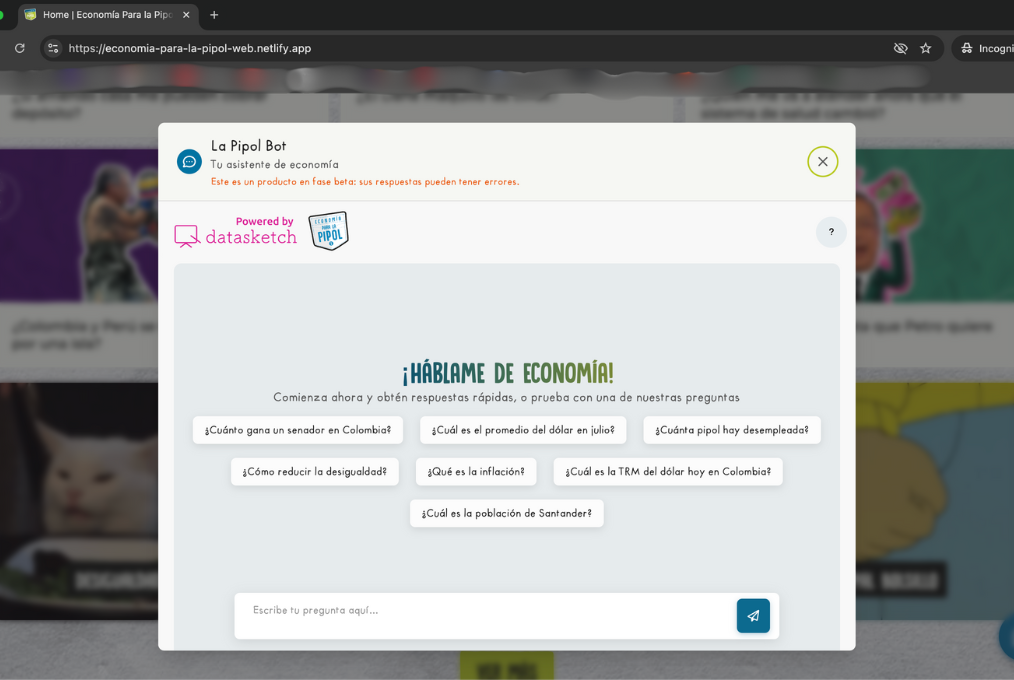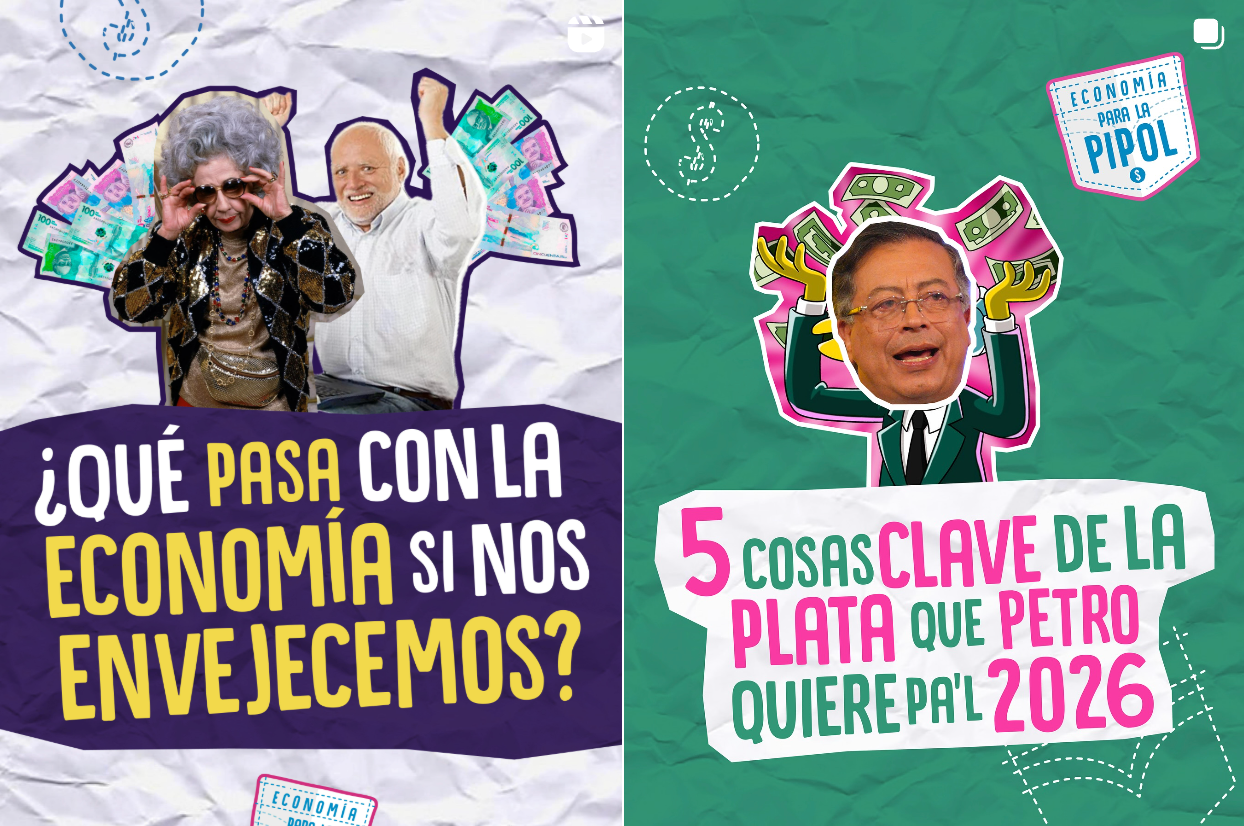How can digital media outlets compete against the most popular generative artificial intelligence (AI) platforms in clarifying people's doubts about economics and finance? Colombian site Economía para la Pipol is trying to do just that with quality information, up-to-date data, and clear, casual language.
Next month, the financial news outlet will launch its own AI-powered chatbot that aims to answer users' money-related questions clearly and simply.
“We want this new tool for Economía para la Pipol to reach a wide audience, to be a safe place to ask questions about economics and finance,” Valerie Cifuentes, the outlet's creative director and co-founder, told LatAm Journalism Review (LJR). “We want people to lose their fear of asking questions and, through answers curated by our team, be able to better understand the topics, get rid of any doubts, and make informed opinions.”

The chatbot's language will be in line with Economía para la Pipol's characteristic way of explaining financial topics. (Photo: Screenshot)
The chatbot, called “Pipol Bot,” was developed as part of a collaboration between Economía para la Pipol and tech company Datasketch in the Innovation Challenge program of JournalismAI and Google News Initiative. The tool's goal is to help bridge the gap between specialized economic information and ordinary people, according to its description in the program.
Economía para la Pipol was born in 2021 with that same purpose, said co-founder and executive director, María Camila González.
“We saw that the way financial news was communicated and reported was geared toward a very specific niche, particularly people in positions of power, who are making decisions, and who already understand the economy,” González told LJR.
The chatbot is scheduled for launch on Sept. 4. Its creators hope its features will offer added value in terms of language, reliability and information quality compared to large language models (LLMs) such as ChatGPT, Gemini or Claude.
Disinformation raged in Colombia during the massive protests in April 2021 against a tax reform bill introduced by the government of then-President Iván Duque. Public concern about the economic crisis unleashed by the COVID-19 pandemic, the threat of potential tax increases, and the political use of information ahead of the following year's elections created the perfect environment for the proliferation of false or misleading information.
It was at this juncture that Economía para la Pipol was born in an attempt by its founders to free people from confusion and fear and explain tax reform, as well as basic economic and financial concepts, in simple language.
“People were feeling the effects of the economic crisis in their pockets and wanted to better understand what was happening,” González said. “People on the streets weren't debating with arguments but with a bunch of fake news. We wanted to explain to people how the economy works, using the same language as fake news and false news channels.”
Four years later, now an established digital media outlet and one year away from another presidential election, Economía para la Pipol is looking to add its AI-powered chatbot to its efforts to provide context and explain the economy so Colombians can make better decisions.
“Pipol Bot” answers users' questions about the economy and money using natural language processing (NLP) and machine learning techniques. It’s backed by information that Economía para la Pipol has researched and reported over its four years of existence. González said this separates it from other conversational AI systems whose sources of information are sometimes of dubious reliability.
“The content is highly curated, and there are also things that might not be easily found online because they come from human sources,” the journalist said. “For example, we know what's happening with the energy transition in Colombia from an interview we conducted with a minister. This isn't necessarily data that's easy to find online. There's a very important added value there.”
Part of the information that feeds the chatbot comes from a database that Economía para la Pipol and Datasketch built with more than 900 questions and answers on the topics covered by the outlet.
"If the user asks questions that have some kind of relationship with the list of questions we already have, even if some terminology is changed, the system automatically detects that relationship with the list of questions we have and responds based on that list," Juliana Galvis, coordinator of the Datasketch team on the project, told LJR.
That list of questions will be updated with new content published by Economía para la Pipol, Galvis said. However, the chatbot also has access to official Colombian financial and economic information, as it is connected to data sources from public institutions such as the Colombian National Department of Statistics (DANE, for its acronym in Spanish) and the Bank of the Republic.
This connection, Galvis said, was made possible through APIs (Application Programming Interfaces), systems that act as "bridges" for two different systems to automatically exchange data or functions.
Being connected to data sources from public institutions will give the chatbot access to constantly updated information. This will allow it to provide users with answers based on up-to-date information, which isn't always the case with other AI platforms, Galvis said.
“Typically, the memory of these AI systems isn't as immediate and isn't as up-to-date on a day-to-day basis, and therefore it's difficult for them to respond to issues that occurred a day or a week ago,” she said. “We were interested in ensuring that this chatbot wouldn't lag behind in the information feed, and that if a person wants information on an indicator today, they can have the most up-to-date information possible.”
Hallucinations are one of the main problems with generative AI models. They occur when the model lacks certain information and "fills in" the information, based on the text patterns it was trained on, with something that sounds coherent but isn't real or correct.

Colombian journalists María Camila González and Valerie Cifuentes founded Economía para la Pipol in 2021. (Photo: Screenshot of Economía para la Pipol website)
For Economía para la Pipol and Datasketch, it was essential to prevent their chatbot from providing falsified responses. Therefore, they limited it to using only two types of information: data already verified by their journalistic team and data from official sources, instead of resorting to open information from the internet as large language models do.
“If you ask ChatGPT about a current economic issue in Colombia today, it will surely give you an answer, but it may not be completely true or validated by a journalistic team,” Galvis said. “If our chatbot is currently responding to something, it was previously checked by Economía para la Pipol.”
“Pipol Bot” is also limited to answering questions about topics specific to Economía para la Pipol, and users who ask about other topics will be notified, Galvis said.
“If, for example, a user asks something that has absolutely nothing to do [with economics], such as 'What is the name of the president of such and such country?', the system, since it doesn't associate that question with the ones we have listed, will respond that it doesn't have that information,” Galvis said.
One of the factors that has distinguished the way Economía para la Pipol covers economic and financial topics is the language it uses, which is distinct from that of most media outlets specializing in these topics.
This simple, casual language, which includes humor, memes, and GIFs, has become an asset to the outlet, even leading its founders to partner with organizations and companies to provide communications consulting and deliver presentations on economic topics in simple language.
“The added value is really the style of storytelling,” González said. “We thought about how we would tell a story, or how to use storytelling more in this and break away from what’s more formal.”
The team used that same language to inform “Pipol bot” so that it would be consistent with the rest of their journalistic products.
“The language we use is even more informal, even like people talk on the street,” González said. “That also connects people to the chat in a different, even more emotional way.”
The chatbot's responsiveness is one of the points appreciated by users who used the tool in the two real-user tests they conducted, one virtual and one in person, with people recruited from the accounts of Economía para la Pipol, González said.
Another factor mentioned in these tests was the credibility of the information, she added.
“People who have used it have told us they would use the Economía para la Pipol chatbot because they feel we've built trust and credibility with our audience, who believe in the journalism we produce,” González said. “They tell us they would use it as a complement to their regular use of ChatGPT and other chatbots, and that's very, very valuable to us.”
Although “Pipol Bot” is almost ready for launch, its development has not been without challenges. One of the main technical challenges was connecting the tool to public data sources, as not all economic institutions in Colombia allow connection to their databases via APIs, Galvis said.
Although DANE allowed this connection, the Datasketch team encountered difficulties in getting the chatbot to use that institution's data.
“The Department of Statistics has access to information in a way that wasn't useful to us. The data structures were very different from those of the system we were building,” Galvis said. “What we had to do technically was transform the DANE data structure into the new structure we needed.”

Economía para la Pipol's simple, casual style, which includes humor, memes, and GIFs, has become an asset to the outlet. (Photo: Screenshot)
The team managed to get the chatbot to connect to data for most of DANE's economic indicators, but not all of the ones they had planned. Galvis said that in a next phase of the tool, they will attempt to connect to data for the remaining indicators.
Another technical challenge Datasketch is working on is fully automating the process of updating databases with content from Economía para la Pipol, as currently there are steps that must be executed manually, Galvis added.
Achieving financial sustainability for the chatbot is also on the list. The tool was funded with a grant from the JournalismAI program, so Economía para la Pipol and Datasketch will have to find ways to continue funding it, not only to maintain it, but also to grow it, González said.
“The grant has limited resources for this period of time to develop the chatbot and for its launch,” the journalist said. “Now our challenge is to find funding to sustain it over time. And to bring it to other platforms, such as WhatsApp.”